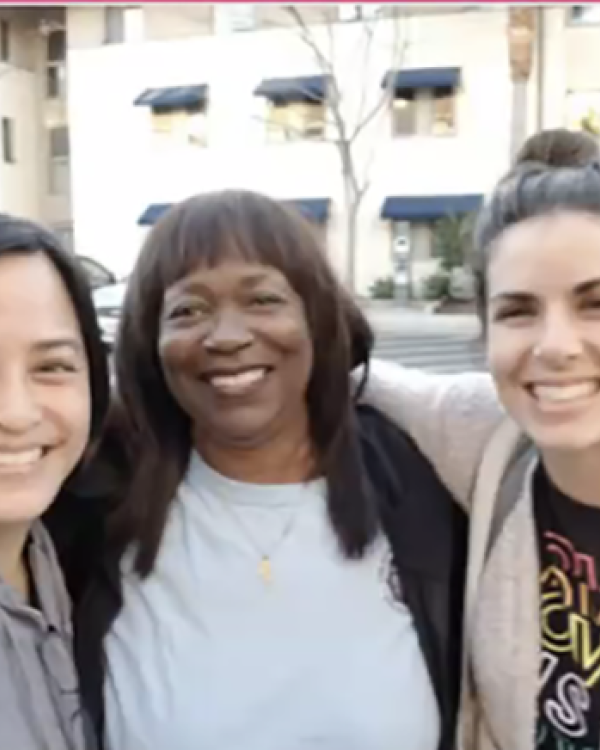
Clare Washington (center), with fellow Department of Education students Noreen Balos and Jenny Sperling
Clare Washington graduated with a Ph.D. from the Department of Education. Her research focuses on the career paths of women of color in historically white universities in California. After graduating, she plans to teach full-time and take on an administrative role at a community college or university.
GGSE: Tell me a little more about your Fulbright Fellowship. How did it help you develop as a researcher?
Washington: My Fulbright Fellowship experience was like nothing else in the world. I lived on the Caribbean twin island of Trinidad & Tobago and attended the University of the West Indies for one year. I not only got the opportunity to visit a new country and attend another university outside of the United States, but also was able to immerse myself completely and learn the culture and experience life through a different lens. I found that learning about my own U.S. history from another country’s viewpoint was really enlightening. Celebrating the country’s holidays and attending the annual festivals allowed me to compare how we celebrate holidays like Christmas and New Year’s Eve in a whole new way. I was also surprised to learn that Trinidad & Tobago have a total of 14 official holidays per year—that’s at least one day off every month from school and work. Holidays required that all schools, banks, grocery stores, fast-food restaurants, and offices be closed. A holiday on the island, whether a major holiday or not, was celebrated with a complete shutdown of everything.
Being able to visit the national archives and museums two or three times a week and read copies of old newspapers dating back to the late 1800s was very inspirational for the research I was conducting on the island. My research agenda brought me in contact with historians who had written books about the island and its people, and they gladly shared their stories with me during interviews related to my research. I learned how to peruse historical sources for research with the assistance of archivists and historians that I would not have been able to learn had I not lived there and experienced so much.
After returning home and beginning my master’s degree program, I found that my experience as a Fulbright Fellow had me positioned very much ahead of some of my fellow classmates in the area of conducting original research and writing about it. I firmly believe to effectively research and write about another country and its people, you need to immerse yourself in that country’s history and culture first if you are able to do so.
GGSE: What are your research interests?
Washington: My current research seeks to illuminate various career paths of women of color leaders at two historically white universities here in California, as well as unique personal, professional, and organizational challenges that may hinder their ascension upward. Hopefully, my study will bring voice to the unique leadership experiences of women of color senior- and executive-level administrators at the two historically white universities. Additionally, I am hoping my research study will illuminate the unique challenges that these women must endure, as they negotiate a system deeply entrenched in a dominant ideology.
After listening to several women of color in academic administrative roles speak about some of the challenges and obstacles they faced as women of color trying to help make a difference on college campuses in the U.S., I decided to utilize some this information as a starting point for my doctoral studies and dissertation.
GGSE: What are your plans after graduation?
Washington: After graduation, I plan on going back to the classroom to teach full time for a while, but I also plan on entering into an administrative role at a community college or university sooner or later.
GGSE: What piece of advice would you like to pass on to future GGSE students?
Washington: First, let your research project be something you choose yourself and are passionate about. You can be most successful in your research and writing in a graduate program if you are passionate about your subject and eager to share your findings with the world. Second, listen to all the advice and guidance your advisor and committee members give you. You cannot help but succeed in the program if you remember these two things.
GGSE: Is there anyone at the GGSE you’d like to thank?
Washington: I am very thankful to my advisor, Professor Betsy Brenner, and committee members, Professor Sharon Conley and Professor Jenny Cook-Gumperz. Their leadership and advice over the past five years have been invaluable. I will always be one of “Betsy’s Kids.” I would also like to thank Professor Mario Garcia from the Chicano/a Studies Department for all his guidance while I was a teaching assistant in the department. I learned more from him in two quarters about the history and culture of Mexico than I could have learned in two full years in a regular classroom setting. Lastly, I want to thank my cohort writing group sisters, Katherine Lee, Noreen Balos, and Elizabeth Villa for helping to make writing a dissertation bearable when times became tough and daunting. My thanks also to other members of GGSE such as Sam Rifkin and Brenda Lavin for providing me answers to sometimes very pressing questions.